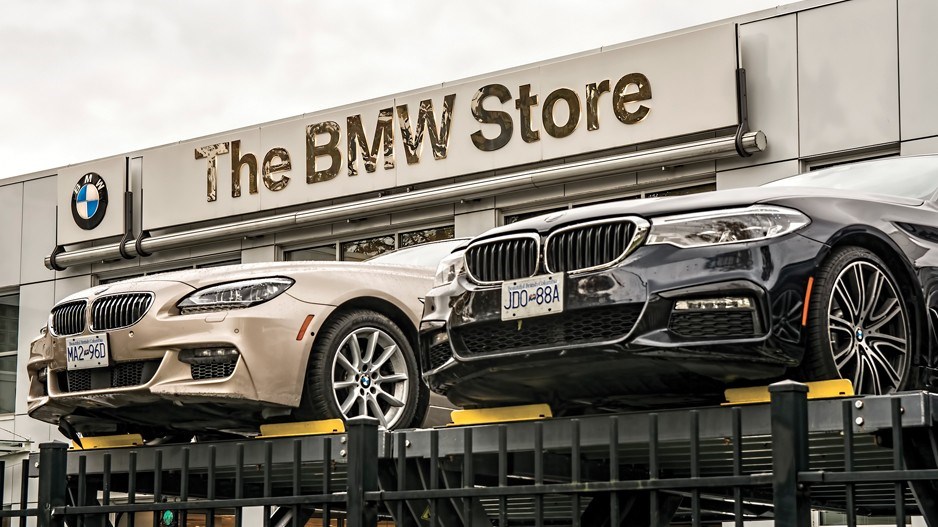Like a new highway cutting through a city centre to make way for motorists, Al-Karim Awadia was anticipating that the years between 2019 and 2025 would deliver more transformative change to the auto industry than any period prior.
“It was a pretty bold statement to say that at the time, but we didn’t realize in the summer of 2019 that our world would be going into a lockdown,” the head of automotive industry for Google Canada recalled about his forecasts from two years ago.
Over the past 18 months consumers have rapidly turned to buying cars online while sales have slumped as more turn to remote work.
But some B.C. companies have been capitalizing on this shift in trends that few could have anticipated in the summer of 2019.
“Canadians are spending less time researching vehicles before making a purchase,” Awadia said during an October panel showcasing Google Canada research on automotive trends. “Online is playing a huge role in the purchase decision.”
Google Canada’s latest data shows 38% of car buyers are making their purchases in fewer than two weeks – up 12% from a year earlier – while 59% have made their purchase in less than a month, compared with 41% in 2020.
Put simply, car buyers are relying more heavily on doing their research online rather than in dealerships, according to Awadia.
But that shift has not decimated dealerships, even as national auto sales in September were down 19.6% compared with a year earlier, according to DesRosiers Automotive Consultants Inc.
Dimitri Kotsalis, vice-president of regional operations for OpenRoad Auto Group Ltd., said drivers still want to touch and feel any vehicles before making a purchase.
“[It] felt like when COVID really hit initially that everybody was going to just jump right to that digital land … but in reality the progression of that has not only been a little slower than what we initially thought may happen, but it’s also turned out to be not what the vast majority of consumers are telling us that they want,” said Kotsalis, whose auto group represents 21 brands at 34 stores.
“They want to be able to see the car up close; they want to be able to sit in it, drive it.”
Google Canada’s data shows 92% of Canadians are still buying their vehicles at dealerships.
And the 6% of new cars bought online may seem like a small number, Awadia said, “but it’s six times’ growth from before the pandemic.”
B.C. tech firms have been quick to seize on the opportunity.
Vancouver-based Canada Drives Ltd. shifted lanes late last year as a fintech best known for securing financing for vehicles to also offering B.C. customers the option of buying used cars through its platform.
There’s no room for any haggling on the platform, but once the vehicle is purchased, Canada Drives delivers it in a trailer within a day of sale.
Because Canada Drives does not rely on stocking inventory at dealership lots located at premium locations, the company’s overhead costs are lower than those of dealers.
Late this summer the company secured $100 million in funding from investors in a bid to service 80% of the Canadian market and add 200 workers over the next year to its current roster of 500 employees.
“We’re just growing both our delivery fleet, the amount of cars we have and the new hiring push to help fuel that growth,” co-CEO Cody Green told BIV in August. “Just seeing it resonate so quickly with Canadians is a pretty exciting thing to be a part of.”
Meanwhile, startup Autozen Technology Ltd. launched an online marketplace for vehicle sales earlier this year after it raised $4.2 million in a private equity investment back in January.
CEO Olivier Vincent told BIV that 150 dealership groups under more than 200 “rooftops” – a term he uses to include individual lots that might fall under the same dealership group – have tapped the firm’s platform as of August.
Users looking to sell can plug in their vehicle’s make, model and year, and Autozen will respond with a range of prices for how much the automobile will likely fetch. The platform is free for consumers to use; Autozen charges a commission to dealers for every vehicle sold.
The Vancouver-based company initially deployed its platform in B.C. and, like Canada Drives, plans to roll it out countrywide.
Meanwhile, Kotsalis said, incumbents like OpenRoad have also been quick to adapt by offering more digital sales initiatives to customers since the pandemic began.
“Whether it’s the finance application or researching for the vehicle themselves, what they’re ultimately looking for seems to be a more seamless transition from the digital world to the physical world, and the ability to walk back and forth between the two at their pace.” •




